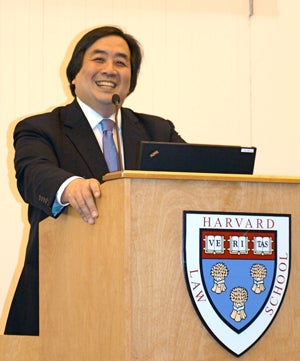Harvard Law School students interested in international law had an opportunity to hear a diverse array of speakers with first-hand experience at the 2010 Harvard International Law Journal Symposium Friday, April 2.
The theme of this year’s symposium was “International Dispute Resolution in Practice,” featuring speakers who described the venues and settings in which international disputes are resolved.
Keynote speaker Harold Koh ‘80, the former Yale Law School dean appointed by President Obama as legal advisor to the U.S. State Department last year, encouraged students to pursue careers as U.S. government lawyers practicing international law. But he also warned that the job can be a difficult one because it often involves working with myriad other agencies and foreign governments with their own myriad agencies.
“It’s an extraordinarily complicated process, which is one reason it’s harder than it looks,” he said.
Koh described part of his job as being legal counsel to his two primary clients: President Obama and Secretary of State Hillary Clinton. That means, he said, that it’s his job to be “the conscience of the President and the Secretary on international law matters—in other words, to tell them not just what’s lawful, but what’s right.”
Lawfulness is not necessarily the measure of what makes a policy good or not, Koh said, because something can be “lawful, but awful.”
Sometimes, he said, American policymakers have tended to see international law as an impediment to American interests. But he said that Obama and Clinton have begun to signal “a new era of international law for the United States, a new respect for international law and its institutions.”
“I would argue that there is an emerging Obama/Clinton doctrine that is in striking contrast to the doctrines of the past.”
He described that doctrine as encompassing a pursuit of “smart power” through diplomacy, “strategic multilateralism,” and a belief that “following the rules of international law makes us stronger, not weaker.”
Despite the job’s frustrations, Koh said, government lawyers have special opportunities to have impact on public policy. But he advised students that it’s not a job for passive lawyers. “If you have trouble speaking in class, you better get over that because there will be times in the government when a future policy—the future of immigration, the future of an individual—stands on your ability to seize that moment and speak for law and prevent something illegal from happening. If you miss that opportunity, it will not come again.”
The symposium also included three panels that examined international dispute resolution in different ways.
One of them focused on litigating before international and regional tribunals and included Taghrid Hikmet, a judge on the International Criminal Tribunal for Rwanda (ICTR) and the first female judge in Jordan.
She described the ICTR as a “fusion of the adversarial and inquisitorial models of criminal law,” and a court that requires prosecutorial responsibilities that might surprise American criminal lawyers.
She said that lawyers prosecuting criminal charges at the ICTR are required to collect both inculpatory and exculpatory evidence. “This supervisory disposition and responsibility burdens the prosecutor with finding the truth,” she said.
Andrew Loewenstein, who practices international law in the firm of Foley Hoag, focused his comments on the International Court of Justice, the United Nations’ principle judicial body for the resolution of legal disputes between nations.
Loewenstein’s practice takes him to the ICJ regularly and he told students that it is much different from any U.S. court. For instance, he said, all presentations to the court are entirely scripted in advance. “What this means in practice is that before oral argument you present the court with a transcript of what you intend to say and you’re not really permitted to deviate one word from your prepared speech.”
Jeffrey Sarles, a partner at Mayer Brown in Chicago, described the unique characteristics of his own international practice and its emphasis on arbitration. Many of these arbitrations result from treaties instead of contracts, and handling these matters in such venues as the World Bank’s International Centre for the Settlement of Investment Disputes in Washington, D.C. is a bit like being at the United Nations because “there are all these simultaneous translations going on.”
One of the problems with arbitration panels, he said, is there are no appellate mechanisms to iron out differences between bodies that reach different conclusion on the same, or similar, facts. This means, he said, that private international arbitrators are making public policy—which creates scenarios in which a state might be forced to pull back new environmental requirements because a foreign investing company objects and gets a positive result from an arbitration panel.
Louis T. Wells, a professor of international management at Harvard Business School, raised the appellate issue again in a second panel that focused on anticipating and confronting corporate non-compliance. “This means that you don’t build case law,” he said. “So conflicting decisions stand and don’t serve as precedents.”
His own hands-on practice in international dispute-resolution matters has been as consultant to host countries who have disagreements with investors. In large part, he said, his consultations focus on preventing nations from proceeding to more formal dispute-resolution forms.
He said it’s important for countries and investors to have agreements containing language about resolving minor disputes so they don’t flare into major disputes because “the result of going into international arbitration is an end to the business relationship almost always.”
A third panel addressed legal efforts for social reform in foreign and international legal venues.
